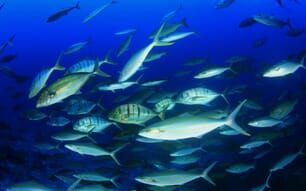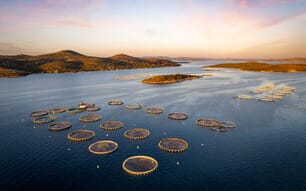The hake trawl fishery, which comprises the inshore sector, targeting predominantly shallow water hake (Merluccius capensis) on South Africa’s South Coast, and the offshore sector, targeting mostly deep water hake (M. paradoxus), on fishing grounds extending from the Namibian border southwards along the Agulhas fringe, was the first hake fishery in the world to be certified against the MSC’s Environmental Standard for Sustainable Fishing. The fishery was originally certified in 2004 and recertified in 2010 for a further five year period.
Striving for continual improvement
The audit team visited Cape Town between the 4-8 March 2013. Meetings were held with the client group and key stakeholders, including fishing industry representatives, government regulators, marine scientists, and environmental NGOs.
The findings based on these interviews and submitted reports showed significant progress in all key areas. Issues highlighted at the previous surveillance audit in 2012 had been addressed to the satisfaction of the review team who noted, in particular, the continued improvement in deep water hake stocks, which are expected to achieve the stock rebuilding targets well ahead of schedule, and the observer coverage that has been raised by the fishing industry to a level that exceeds what was in place when the fishery was re-certified.
In past years the hake industry has agreed to significant quota reductions based on scientific recommendations to rebuild deep water hake stocks and, most importantly, to increase catch per
unit effort. This initiative is now paying off as quotas can be slowly increased again to preferred
target levels, providing stability in catches. The audit confirmed that these precautionary management principles conform to international best practice.
The previous audit raised specific concerns about the lapse of the Government’s Offshore Resource
Observer Programme. Reviewers took into consideration steps that have been taken by the Fisheries Branch of the Department of Agriculture, Forestry and Fisheries (DAFF) to ensure that this is reinstated. The contract for the provision of observers is in the final stages of completion and the Department provided assurances that the programme will be reinstated in the 2013-14 Financial Year.
The assessment team also noted that collaboration between the client, the South African Deep Sea Trawl Industry Association (SADSTIA) and DAFF has further been strengthened by the formation of an official MSC Liaison Committee.
Five conditions have been closed at this audit, while progress on the open conditions remains on track. It was however also noted that there are some key deadlines that need to be met in the coming year to ensure that the four remaining conditions are addressed. This will require intensive endeavour between the parties.
The assessment team recommended that present research and annual surveys be sustained and continuously reviewed for weaknesses. This follows the problems blighting the Department’s main research vessel, the RV Africana, during the past 12 months; an issue which is being addressed at present. The assessment team were also encouraged by steps taken by DAFF to ensure that offshore patrol vessels are redeployed to restore the high levels of control and compliance last seen in 2011, prior to the problems with management of the fishery patrol vessel fleet during 2012.
Protecting and growing key markets
South African hake sold to European markets accounts for up to R1.9 billion in annual revenue, with the deep sea trawling sector employing 6,500 people. There is increasing global demand for sustainable seafood that can be traced back to fisheries with credible third party certification and many European and North American markets now demand it from their suppliers. Supported by government, industry and market stakeholders, the hake trawl sector’s MSC status places it amongst the best managed fisheries in the world, helping to maintain its presence and opening new doors into these markets.
Minister of Agriculture, Forestry and Fisheries, Tina Joemat-Pettersson said: “The South African government remains supportive of any initiative that contributes to the well-being of our natural environment whilst also helping to secure jobs for local South Africans. We have again demonstrated our commitment to the on-going certification of the hake trawl fishery and will continue to work alongside the MSC and industry to ensure we can continue to maximise opportunities in existing and prospective markets.”
Roy Bross, Secretary of client group SADSTIA, said: “The report is very positive for the hake industry
and its reassuring to have independent recognition of the work that has gone into meeting the conditions that were set out in the previous surveillance report. Whilst we have no doubts about the continued certification of our fishery, there is much to be done in the next 10 months to ensure that the remaining conditions are closed out in 2014. We are entirely confident that the existing level of Public/Private Sector partnership and co-operation will ensure that the considerable load of upcoming work on fisheries monitoring, bycatch and benthic research and scientific surveys will be properly finished in time, provided all parties stick to their programmes. We feel that the hake fishery is already very well managed, but MSC certification encourages continued improvement in line with global best practice.”



